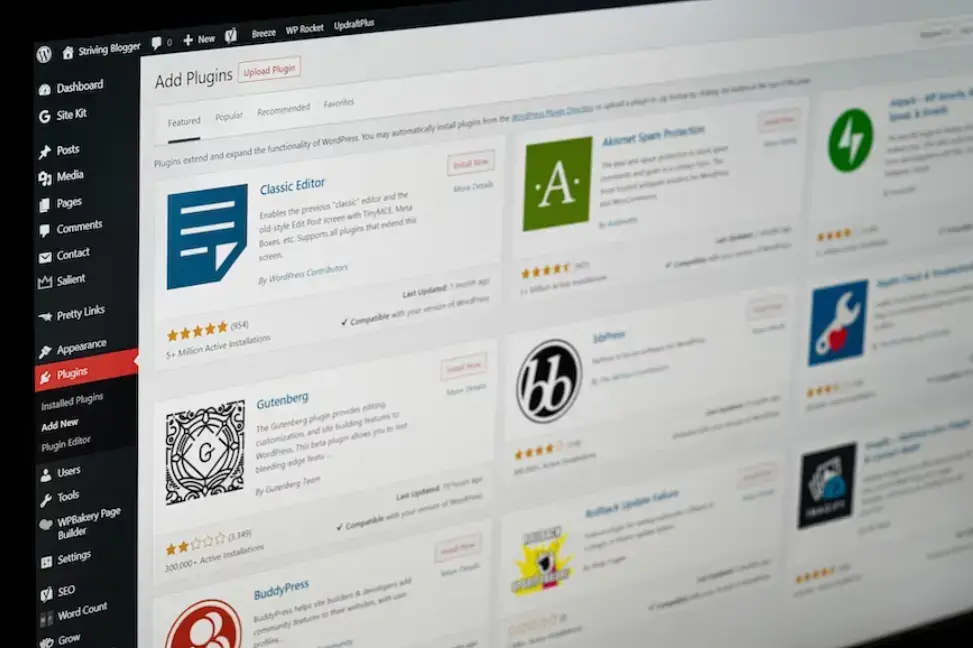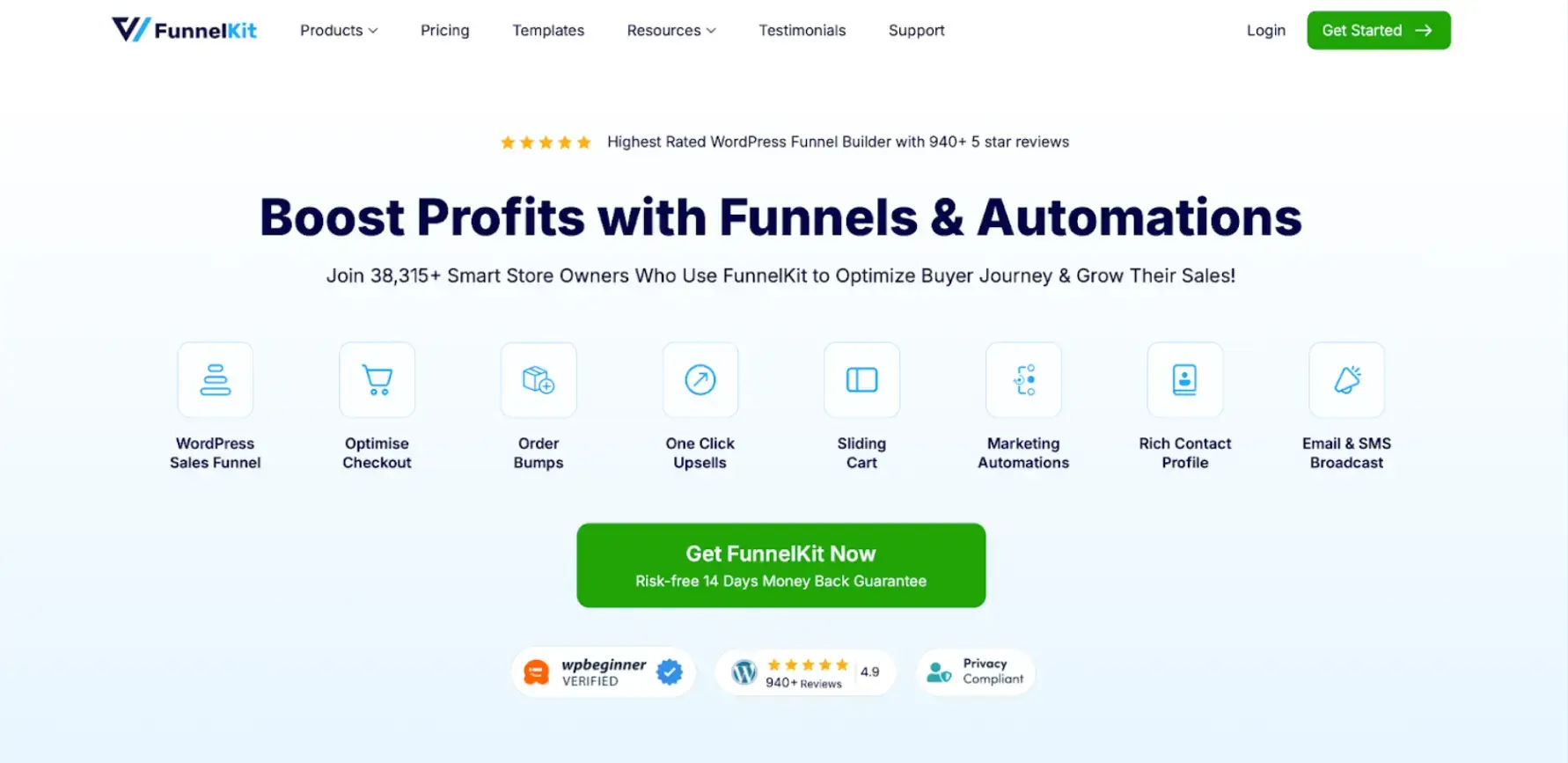Plugins play a crucial role in helping you build a high-performing WordPress website.They add essential functions to your website, such as creating an online store, improving SEO, live chat, social media integration, image optimizations, and more.
The right plugins can help you improve speed, organic growth traffic, user experience, conversions, and security. They can give you a competitive edge, simplify online business expansion, and level up your platform.
- WP Rocket
- WooCommerce
- FunnelKit
- Yoast SEO
- Advanced Custom Fields (ACF)
- TinyPNG
- POWR Instagram Feed
- Challan
- Form Builder
- CartFlows
- Bonus Tool: WPLoyalty
Over 50,000 free and premium plugins are in the WordPress directory, and thousands more are available on third-party sites.

50,000+ WordPress Plugins to Choose From (Image source)
Choosing the right ones is a somewhat challenging experience. To help you get started, here are seven must-have WordPress plugins you should consider installing for a robust WordPress website.
1. WP Rocket
WP Rocket is a premium cache plugin. It’s perhaps the most powerful caching tool out there for WordPress and the only one allowed on WP Engine, one of the most popular hosting platforms for WordPress sites.
It intelligently manages website caching — or data storage — to help you achieve outstanding page-load speeds and site performance.
It, in turn, helps user experience, conversions, and your SEO rankings.
It automatically targets a range of performance optimizations, including static caching on mobile and desktop, browser caching on Apache, detection of third-party plugins and themes, and more.
If you prefer to customize the plugin, you have many advanced options, including lazy image loading, Google Fonts optimization, deferred JS file loading, and preloading XML sitemaps.
WP Rocket is easy to install with no configuration required. Simply choose your preferred plan and add it to your website.
2. WooCommerce
WooCommerce is arguably the world’s most popular open-source eCommerce solution. It can quickly transform any WordPress blog into a fully-fledged online store.
It’s used by a little under 30 million e-commerce stores worldwide.
You can use WooCommerce to sell physical and digital products and services. It offers hundreds of extensions, giving you a range of functions and features you can implement.
You can handle everything from invoicing to payments, currency management, inventory, shipping, taxation, and more.
While it’s a plug-and-play solution, its list of customizations is virtually endless. For instance, while WooCommerce offers excellent support for mobile devices, you can pair it with a lightweight WooCommerce-compatible theme to further improve performance.
WooCommerce is a freemium plugin with excellent features under its basic, free-to-use tier. It’s available for download on the WordPress plugin library.
3. FunnelKit

FunnelKit is an all-in-one sales funnel builder designed to help WooCommerce store owners maximize conversions and revenue without needing any coding or technical expertise.
With FunnelKit, you can easily create optimized checkout pages, one-click order bumps, upsells, and thank-you pages that guide shoppers smoothly through the buying process.
It comes with ready-to-use templates and page builder compatibility, making it perfect for beginners who want professional-looking funnels in minutes.
What sets FunnelKit apart is its focus on affordability and flexibility. The free version includes essential checkout customization and funnel-building tools to help you start optimizing your store right away.
You can even upgrade to the premium version for access to smart features like one-click upsells, A/B testing, and detailed funnel analytics.
Whether you’re launching a new product, increasing average order value, or improving checkout conversions, FunnelKit equips you with the tools to scale your WooCommerce business faster and more efficiently.
4. Yoast SEO

Yoast SEO is the most widely used WordPress SEO plugin. SEO experts built it to help make SEO accessible to everyone. Over 13 million stores use this plugin.
Yoast SEO is well-known for its state-of-the-art SEO and content analysis. It helps you create high-performing, SEO-friendly content that helps increase your search ranking and on-site conversion.
It offers powerful previews to see your content’s appearance when syndicated or featured on different platforms, such as social media sites and search engines.
It also provides various automated technical improvements, such as canonical URLs, meta tags, page load speed, and more.
Yoast SEO Free offers you everything you need to manage your SEO.
Depending on your situation, its paid tier may be just as valuable an investment as professional WordPress SEO services from an agency.

5. Advanced Custom Fields (ACF)
ACF converts a basic WordPress website into a fully functional content management system (CMS).
You typically use it to create custom blocks and fields for WordPress screens.
Custom fields are a handy feature that makes adding, storing, and displaying information on your site easy. For instance, you can use them to update an event calendar or add product information such as price, weight, and color.
ACF makes it easy to add these fields with just a few clicks. You can add them anywhere you like — pages, posts, media, user profiles, comments, and more.
6. TinyPNG

TinyPNG is an image optimization plugin for PNG, JPEG, and WebP images. It uses intelligent lossy compression to reduce file size.
It helps you build a lightweight website that loads quickly, even if you have an extensive portfolio of images.
TinyPNG is popular because it achieves large file compressions with almost no visible difference and supports animated PNGs as well as partial transparency.
The plugin is free with a paid tier that unlocks bulk file compression and unlimited file sizes.
7. POWR Instagram Feed

As the name suggests, this plugin helps integrate an Instagram feed into your website. You can even display photos from multiple Instagram accounts in the same feed.
It’s fully customizable — you can personalize height, width, image sizes, number of columns, background, spacing, and more. You can even add JavaScript or CSS for advanced customization.
This plugin automates image uploads to your website and is simple to install and set up. Free and paid versions are available.
8. Challan – PDF Invoice & Packing Slip for WooCommerce

Challan is a freemium plugin that helps generate invoices and packing slips for WooCommerce stores.
You can attach PDF invoices and packing slips automatically with order confirmation emails. Its interface is simple, allowing you to configure shipping, billing, VAT, and labels easily.
Challan lets you customize logos, invoice numbers, product titles, and more. You can choose from multiple templates and bulk download invoices.
The Pro version includes product images, descriptions, and categories, plus multilingual and multi-currency support. Pricing plans include free and three premium options, billed annually or lifetime.
9. POWR Form Builder

POWR Form Builder helps you build custom forms to capture data and broaden your reach.
With it, you can create any form on WordPress with features like dropdowns, checkboxes, radio buttons, and taxonomies.
For advanced features like app integrations or front-end display of form data, upgrade your POWR Form Builder plan. It’s a turnkey, no-code plugin — just install and go.
10. CartFlows
CartFlows is a powerful sales funnel builder that helps maximize conversions and boost revenue on WordPress.
It optimizes the checkout process with features like order bumps, cart abandonment recovery, and seamless WooCommerce integration. The Pro version unlocks one-click upsells, A/B testing, and funnel analytics.
With pre-built templates and deep customization, CartFlows makes selling online effortless and more profitable.
Bonus Tool: WPLoyalty

WPLoyalty is a WooCommerce points-and-rewards plugin that lets you create a loyalty program for your store.
Reward customers for purchases, signups, reviews, referrals, social shares, and more. WPLoyalty integrates well with WooCommerce review plugins, enabling you to reward customers for leaving product reviews.
It provides features like conditional campaigns, scheduling, and customer management to boost retention.
How to Use WPLoyalty?
Setup Campaigns: Create loyalty campaigns for various activities.
Reward Redemption: Offer multiple reward types based on business goals.
Customization: Adjust points, expiry dates, and campaign visibility.
Monitor & Manage: Use WPLoyalty’s dashboard to track engagement and manage rewards.
Conclusion
Plugins are the building blocks of your WordPress website. The primary functions and features your theme offers are often insufficient to provide superior user experiences, and adding new capabilities typically requires developer assistance.
With low-code or no-code plugins, you can customize your website to grow your business however you want.

Author Bio
Jordan Brannon is the President / COO of Coalition Technologies: a top-ranked marketing and web development agency with 700+ case studies and 300 team members worldwide.



